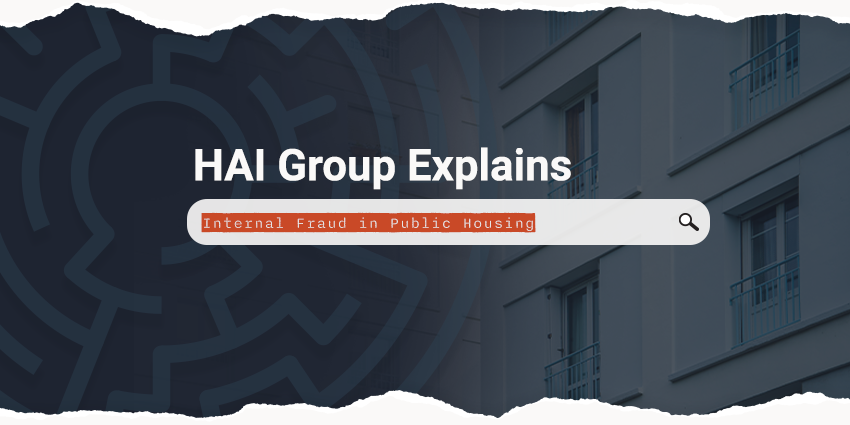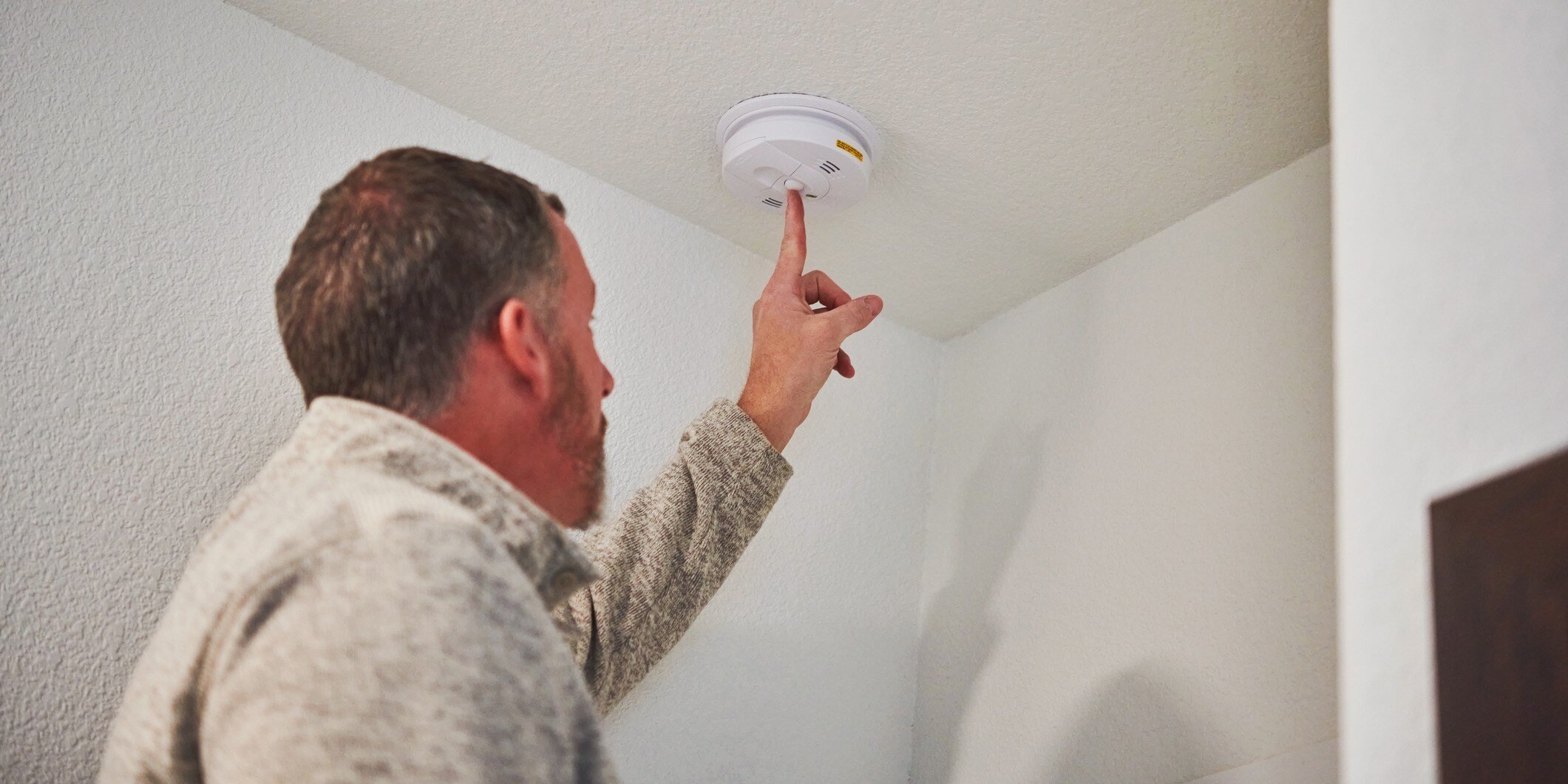The insurance industry has spotlighted the rise of external fraud, and rightfully so, as cybersecurity incidents continue impacting organizations at an alarming rate. But incidents of internal fraud—a dishonest or fraudulent act committed by one or more employees—remain a constant threat to housing organizations.
Internal fraud, also referred to as employee fraud, can occur over a wide range of activities, including rent collection and physical inventory manipulation, said Rich Larsen, CPA, a partner with Novogradac & Company LLP.
Larsen provides auditing services to around 70 public housing organizations nationwide and has first-hand experience identifying incidents of internal fraud and working with housing organizations to implement internal controls.
So how can your housing organizations prevent internal fraud? Watch our full interview with Larsen below, or continue reading to learn more about the threat of internal fraud in public and affordable housing.
Common examples of internal fraud in housing
“In my experience, the most common fraud is with rent collections at remote sites where employees receive payments (cash or checks) and pocket it,” Larsen said. “The employees are then able to adjust the accounts receivable report to reflect payment or write off the amount owed.”
While common, incidents of fraud involving rent collection can be prevented through a few simple controls, according to Larsen.
- Employees taking rent payments should not be able to adjust tenant accounts.
- The accounting system should provide a computer-generated receipt for the tenant.
- Copies of deposit slips and checks should be provided daily to the finance team for recording.
- Tenant statements should be sent out at least monthly by the finance team.
There’s often an assumption that employees involved in an organization’s accounting functions are more likely to participate in fraud because of their access to financial information. That’s a misconception, Larsen said.

“With internal finance and accounting fraud, generally, there needs to be a collusion between at least two individuals, because the accounting function will generally have more oversight and segregation of duties than other functions,” he said. “So, it is not as pervasive as people might think.”
Larsen said he’s seeing more internal fraud cases involving employees with custody over physical assets.
“Specifically, laptops, phones, and other electronic equipment,” he said. “How hard is it for an IT supervisor to order a couple of extra phones or laptops and sell them personally? Or what about a maintenance supervisor who over-orders lumber, fixtures, or equipment when a housing authority is rehabbing a property? Housing organizations need to have adequate controls over that purchasing process.”
All capital assets over a specified value should be tagged and tracked by someone independent of the purchasing process, Larsen said.
“We also recommend surprise counts to verify equipment is still on hand and in use,” he added.
Deterring internal fraud by setting the right ‘tone at the top’
Housing organizations of all sizes are at risk of experiencing internal fraud.
“Size doesn’t matter,” Larsen said. “What matters most, in terms of risk, is the tone at the top. That’s the example set by the housing organization’s board of commissioners and executive director.”
Organizations that prioritize fraud prevention and provide employees with a mechanism to report fraud anonymously have the least amount of fraud, he noted. If employees aren’t encouraged to report internal fraud and don’t have a mechanism to do so anonymously, the problem can become pervasive.
“Most employees have an incredible amount of pride in their work and believe in the housing organization’s mission, so if they see fraud, they will report it,” Larsen said. “But only if reporting is encouraged by management and employees can file reports anonymously and without any repercussions.”
Reporting a coworker or supervisor can create a tense situation, and if an employee believes they can lose their job for speaking up, “they’re not going to do it,” he added.
Preventing internal fraud with limited staff resources
While an organization’s size isn’t the most significant indication of internal fraud risk, it’s fair to assume a smaller housing organization might have trouble keeping tabs on internal fraud.
“It is very hard with a limited number of employees for small housing organizations to properly segregate bookkeeping duties,” Larsen said. “When that occurs, we will routinely ask management to involve someone outside the accounting function.”
The solution can be as simple as making a board member or the executive director part of the process. For example, an organization can send bank statements directly to the executive director for review and approval before looping in the bookkeeper.
“The process may only take 25 to 30 minutes a month, but it lets people know someone is checking, and someone is performing that control function,” Larsen said.
Sharing passwords is also a potential risk factor for internal fraud. When employees share passwords, it overrides the established system of internal control, Larsen said.
“In no circumstance should an employee provide their password to another employee or have that password easily accessible to other employees,” he said. “If an employee needs your password to perform their job, then there is a problem with that employee’s job responsibilities.”
Reporting suspected cases of internal fraud

How should a housing organization react to a report of internal fraud?
“The answer really depends on the type of fraud and who is involved,” Larsen said.
A housing organization that receives an internal fraud claim should examine financial records and, if necessary, work with an outside auditor or attorney. An assessment needs to be done to determine who is potentially involved and the level of loss. This factors into the subsequent steps the housing organization takes, such as handling discipline internally or contacting the police or HUD.
“As an auditor, I have found fraud where both the board of commissioners and executive participated in the fraud, so my obligation as an auditor was to go to the next level up, which was the local prosecutor and HUD,” Larsen said.
In most cases, it’s recommended that housing organizations contact the police and their local HUD office to have an investigation started into the suspected fraud. Employees’ rights must be protected, so any inquiry should involve an organization’s legal counsel.
Insuring against internal fraud
Public housing organizations are required to carry employee dishonesty coverage to cover losses incurred by internal fraud. Minimum coverage limits are based on a housing organization’s cash flow, said Lynn Crisci, HAI Group’s assistant director of product development.
Crisci said she recommends that housing organizations purchase additional crime coverage on top of their employee dishonesty coverage to meet HUD requirements. This coverage differs depending on the carrier, but often covers employee fraud, counterfeit, and theft claims, and may even include digital aspects like computer fraud and social engineering.
“You have to be proactive with this coverage for the potential exposure involved, especially in these economic hard times,” she said. “The coverage is actually inexpensive for what you get.”
That said, there’s a burden of proof on the part of the housing organization when filing a claim. A thorough investigation must be conducted by an organization that suspects internal fraud, said Mike Pepe, an HAI Group claims manager.
“A claim would not be accepted unless fraud was proven to have occurred,” Pepe said, noting that all investigative documentation must be shared with the claims team.
The recovery process for internal fraud claims can be slow because of the nature of the crime. He noted that fraud investigations could take months or longer, especially for incidents that date back several years. And if criminal charges are filed, the claims process can slow down further since a guilty verdict may involve restitution.
Contact our Risk Control and Consulting team for more resources and answers to your housing organization’s risk-related questions.
Interested in Working With HAI Group? Our Account Services team is ready to assist you.
This article is for general information only. HAI Group® makes no representation or warranty about the accuracy or applicability of this information for any particular use or circumstance. Your use of this information is at your own discretion and risk. HAI Group® and any author or contributor identified herein assume no responsibility for your use of this information. You should consult with your attorney or subject matter advisor before adopting any risk management strategy or policy.
HAI Group® is a marketing name used to refer to insurers, a producer, and related service providers affiliated through a common mission, management, and governance. Property-casualty insurance and related services are written or provided by Housing Authority Property Insurance, A Mutual Company; Housing Enterprise Insurance Company, Inc.; Housing Specialty Insurance Company, Inc.; Housing Investment Group, Inc.; and Housing Insurance Services (DBA Housing Insurance Agency Services in NY and MI).







